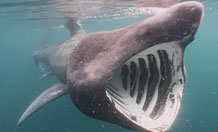Articles

If a member of the public spots a basking shark, the team would like them to call the hotline as soon as possible on 07935 098122 and give approximate location, date, time and number of sharks
Public urged to report basking shark sightings for new tracking project
The University of Exeter and the Marine Conservation Society are joining forces in an exciting new satellite tracking project to tag and follow basking sharks in Cornish waters, and are asking sea users, beach goers and coastal walkers to help spot and report these gentle giants when they arrive in our waters this Spring.
As warmer weather draws closer and holidaymakers once again flock to the South West’s stunning coastlines, basking sharks will also make their annual reappearance to feed at the surface on seasonal plankton blooms. The shark’s large and distinctive dorsal fin, tail, and sometimes their snouts breaking the sea surface as they feed are easily spotted, even by the casual observer.
Although basking sharks are the world’s second largest fish, little is known about them. Building on the success of the University’s recent basking shark satellite tagging work in Scotland, and the MCS’s long-term Basking Shark Watch public reporting programme, this Spring the team will attach cutting-edge satellite tracking tags to several basking sharks in Cornwall’s seas.
Basking sharks are considered ‘Endangered’ in the North East Atlantic due to historical population declines resulting from basking shark fishing. The sharks were hunted for the oil in their huge livers. The UK fishery only completely stopped in the 1990s when they were protected by law.
By finding out more about the movements of basking sharks, and identifying the areas of sea they feed in and migrate to and from, the team hope to understand how conservation action can best help UK basking shark populations recover.
Dr Matthew Witt of the University of Exeter's Environment and Sustainability Institute said: “Basking sharks are part of the fabric of Cornish tradition and culture; yet apart from their seasonal arrival in the spring at places such as Porthcurno and Sennen Cove we know very little of their individual behaviour around the shores of the South West”.
“In Scotland over the past three years we used high-tech tracking devices to follow individual sharks and found their individual behaviour to be incredibly variable. This makes us suspect that sharks in the South West might be similar. Having a better understanding as to whether basking sharks we see here move north from Cornwall during the summer, stay locally or do something entirely different would help enormously in our efforts to conserve these large and magnificent creatures.”
Basking sharks are the largest fish in British waters, reaching lengths of up to 12 m. They have a huge mouth, a large characteristic shark dorsal fin and their gill slits almost encircle the head. Basking sharks are common in inshore waters during the summer, almost to the surf line. They tend to prefer fronts around headlands, islands and in enclosed areas with strong tidal flows.
Dr Peter Richardson, Marine Conservation Society Biodiversity and Fisheries Programme Manager said: “Our Basking Shark Watch project has received public reports of basking sharks in UK waters for almost thirty years. The project has allowed us to identify UK basking shark hotspots and successfully lobby for protection of basking sharks under law, so the public has already played a very important role in the conservation of these amazing animals. As always, we still want people to report their UK shark sightings to MCS, but this year we are also urging sea, beach and coast users in Cornwall to ring the University’s tagging project hotline so we can quickly locate the sharks as soon as they arrive and attempt to tag them. This is a fantastic opportunity to find out more about the lives of these spectacular, threatened giants of the deep, and how best we can help them.”
If a member of the public spots a basking shark, the team would like them to call the basking shark hotline as soon as possible on 07935 098122 and give approximate location, date, time, number of sharks and any other information they think might be important.
As well as enabling them to locate the sharks and attach a small tag, the information will also be logged with the MCS Basking Shark Watch project, and will be passed on to regional reporting schemes.
Deliberate and reckless disturbance of basking sharks is prohibited by law in the UK, and so the team are urging the public not to approach the sharks or disturb them, but do encourage people to enjoy one of Cornwall’s most spectacular marine species at a safe distance.
Dr Lucy Hawkes of the Centre for Ecology and Conservation at the University of Exeter added: “Basking sharks are important regulators of the seas and, with other large plankton eating species, help keep things in check. Once hunted in their tens of thousands across the North Atlantic, it is likely the population might be slowly increasing, but the threats they face now are very different to those of wide-scale hunting of the past. This means that all of the knowledge we can gather is useful to understand how we might look to protect them now and into the future so that they remain an important feature of Cornwall’s marine and coastal heritage.”
The hotline is a standard UK mobile, so calls and texts will be charged at your normal rate.
Date: 7 April 2015
